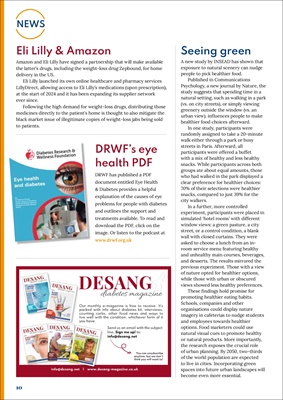
10
NEWS
Eli Lilly & Amazon
Amazon and Eli Lilly have signed a partnership that will make available
the latter's drugs, including the weight-loss drug Zepbound, for home
delivery in the US.
Eli Lilly launched its own online healthcare and pharmacy services
LillyDirect, allowing access to Eli Lilly's medications (upon prescription),
at the start of 2024 and it has been expanding its supplier network
ever since.
Following the high demand for weight-loss drugs, distributing those
medicines directly to the patient's home is thought to also mitigate the
black market issue of illegitimate copies of weight-loss jabs being sold
to patients.
Seeing green
A new study by INSEAD has shown that
exposure to natural scenery can nudge
people to pick healthier food.
Published in Communications
Psychology, a new journal by Nature, the
study suggests that spending time in a
natural setting, such as walking in a park
(vs. on city streets), or simply viewing
greenery outside the window (vs. an
urban view), influences people to make
healthier food choices afterward.
In one study, participants were
randomly assigned to take a 20-minute
walk either through a park or busy
streets in Paris. Afterward, all
participants were offered a buffet
with a mix of healthy and less healthy
snacks. While participants across both
groups ate about equal amounts, those
who had walked in the park displayed a
clear preference for healthier choices:
70% of their selections were healthier
snacks, compared to just 39% for the
city walkers.
In a further, more controlled
experiment, participants were placed in
simulated 'hotel rooms' with different
window views: a green pasture, a city
street, or a control condition, a blank
wall with closed curtains. They were
asked to choose a lunch from an inroom
service menu featuring healthy
and unhealthy main courses, beverages,
and desserts. The results mirrored the
previous experiment. Those with a view
of nature opted for healthier options,
while those with urban or obscured
views showed less healthy preferences.
These findings hold promise for
promoting healthier eating habits.
Schools, companies and other
organisations could display nature
imagery in cafeterias to nudge students
and employees towards healthier
options. Food marketers could use
natural visual cues to promote healthy
or natural products. More importantly,
the research exposes the crucial role
of urban planning. By 2050, two-thirds
of the world population are expected
to live in cities. Incorporating green
spaces into future urban landscapes will
become even more essential.
DRWF's eye
health PDF
DRWF has published a PDF
document entitled Eye Health
& Diabetes provides a helpful
explanation of the causes of eye
problems for people with diabetes
and outlines the support and
treatments available. To read and
download the PDF, click on the
image. Or listen to the podcast at
www.drwf.org.uk